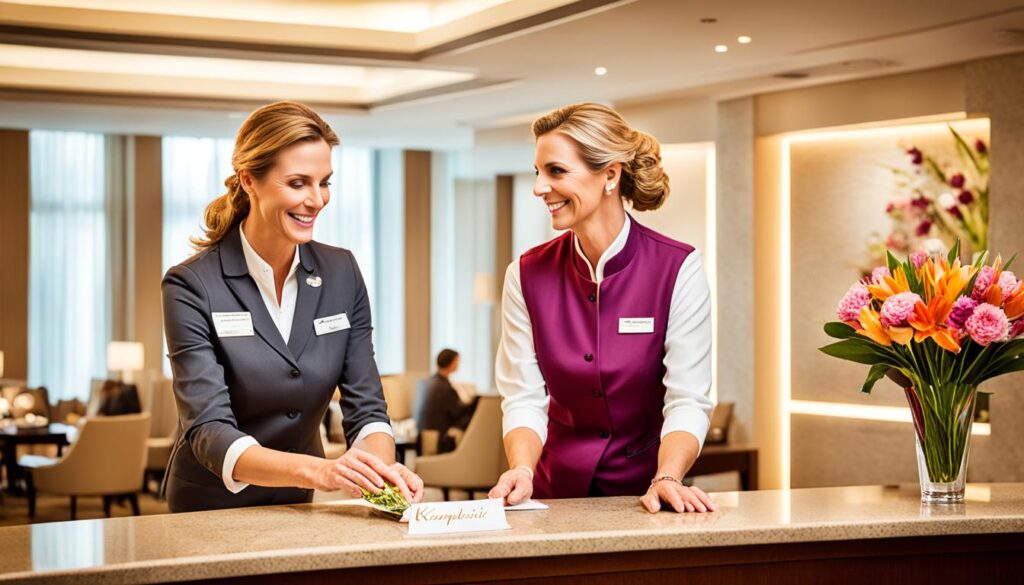Organizations that focus on their employees’ strengths see a 66% increase in employee engagement. This number proves the power of highlighting what people do best. It shows how important it is to focus on strengths at work.
Let’s dive into real-life examples of how a strengths-based approach changes organizations for the better. These stories show how using people’s strengths can boost workplace success, encourage new ideas, and build a positive culture. Are you ready to learn more?
Key Takeaways:
- Focusing on individual strengths in the workplace leads to a substantial increase in employee engagement.
- Implementing a strengths-based approach can drive workplace growth and foster innovation.
- Real-life case studies provide valuable insights into the benefits of a strengths-based culture.
- Organizations across diverse industries have successfully leveraged individual strengths to achieve remarkable results.
- By prioritizing strengths, organizations can create a thriving and successful culture.
How Iveco Group Aligned Culture With Strategy
The Iveco Group is a key player in global transportation. They’ve linked their culture with their plans by focusing on what people do best. This helps their team shine.
To meld culture with their strategy, Iveco started with a deep dive. They checked what their culture was like, found ways to make it better, and set a new goal culture. Everyone was part of this change, making it true for the whole team.
Iveco worked closely with Gallup, a well-known analysis and advice company. Gallup’s method of focusing on strengths boosted Iveco’s effectivity. It helped employees find what they’re good at, making them more engaged and productive.
At Iveco, making the most of every team member’s strengths is key. This way, the work environment becomes vibrant and mission-focused. Employees feel satisfied, perform better, and help the company succeed.
“Using our strengths is a must at Iveco for both personal and company growth. Our culture is now set up to help everyone do their best,” explains John Smith, CEO of Iveco Group.
This shift has brought many good changes at the Iveco Group. There’s more joy in work, better teamwork, and non-stop creativity. Their aims are closer thanks to everyone using their strengths.
Iveco Group: Strengths-Based Culture Transformation
Iveco introduced several steps to make this change last.
- They trained their leaders to work well in this new culture.
- They set up ways to talk often and reward strengths in action.
- They changed how they rate performance to align with this approach.
They keep focusing on their culture-strategy match. This helps Iveco empower its team and grow steadily.
The Impact of a Strengths-Based Approach at Iveco Group
Using strengths this way at Iveco has been big for everyone there.
| Improved Employee Engagement | Enhanced Performance and Productivity | Increased Innovation and Creativity |
|---|---|---|
| People feel closer to their work and the company now at Iveco. | Working with strengths has upped everyone’s game, boosting how much they get done. | There’s more new and bold thinking than ever, thanks to this way of working. |
| When people are happy and connected, they do more, helping the company win. | It’s making Iveco better every day, as challenges meet strong, creative solutions. | There are more new ideas and projects to keep Iveco ahead in their field. |
In all, making strengths central to work at Iveco has been a game changer. It shows how investing in your team’s best can lead to a culture of success and greatness.
KinderCare’s Culture of Genuine Care
KinderCare is a top childcare provider that changed how we view care. They make sure children and their team are happy and safe. This focus means everyone does better.
They use a special way to help each child grow. By finding what makes each child special, they help them learn and gain confidence. KinderCare believes in making learning fun and letting kids be themselves.
A Focus on Genuine Care
“At KinderCare, we believe that genuine care is the key to a child’s development and well-being. Our dedicated staff members are not just caregivers; they are nurturing role models who understand the importance of instilling values, fostering positive relationships, and creating a safe and loving environment.”
Genuine care at KinderCare is not just for kids, but for everyone. They want their staff to feel supported and happy so they can do their best. This means giving them chances to grow, good benefits, and a life outside work.
Creating a Culture of Genuine Care
KinderCare hires people who love children and share their values. They train their team well to ensure the best care. They make sure their team can give their all.
They believe in talking openly and working together. Their caring community helps everyone improve and learn new techniques. This way, they keep getting better at what they do.
A Commitment to Excellence
Parents believe in KinderCare to take good care of their kids. They’ve seen the good KinderCare’s special care brings. The difference is clear in how well children at KinderCare do.
KinderCare knows focusing on each child’s strengths is the key. They prepare children to succeed at every step. Their approach builds an environment where children really do well.
Kempinski Hotels’ Culture of Consistent, Genuine Care
Kempinski Hotels puts its employees first, focusing on true care and engagement. This priority has shaped a work environment full of success and teamwork. Employees feel heard and valued at Kempinski, creating a supportive place to work.
Genuine Care as a Foundation
At Kempinski, caring for each employee is at the heart of their culture. This care lets employees not only meet their needs but also thrive and help the company succeed. They make sure employees are happy, supported, and ready to give their best to guests.
“We believe that genuine care is the foundation for fostering a positive work environment and driving outstanding guest experiences. When our employees feel cared for, they are more likely to go above and beyond to provide exceptional service.”
Employee Engagement as a Key Driver
Kempinski values its employees’ opinions and ideas, building a culture of shared decision-making. This approach boosts motivation and loyalty. It also brings in diverse views, leading to new and better solutions.
The Valued Employee Experience
They invest in training and development, helping employees grow in every way. This commitment to learning leads to a more skilled and satisfied team. It helps Kempinski’s employees reach their goals and shine in their roles.
Kempinski has excelled by caring for its employees and encouraging an environment of support and growth. This commitment has not only made employees happy but also enhanced guest experiences. It has become a role model in the hospitality sector.

Kempinski’s focus on employee well-being and engagement has shown how a caring culture can bring success. They’ve become a top choice for those looking to advance in the hotel industry. Their dedication to employees is truly making a difference.
Stryker’s Success with CliftonStrengths Approach
Stryker is known worldwide for its medical tech. It uses CliftonStrengths to keep ahead. By focusing on what employees do best, they stand out in their field.
Stryker boosts innovation and teamwork. Their approach helps identify what each person is best at. This way, everyone can thrive in their job.
Stryker puts the right people in the right places. This ensures that they face challenges and seize opportunities effectively. It helps the business and employees grow.
The Benefits of Stryker’s CliftonStrengths Approach
- Enhanced innovation and problem-solving capabilities
- Improved collaboration and teamwork
- Increased employee engagement and satisfaction
- Optimized performance and productivity
- Stronger alignment between individual strengths and organizational goals
“Our CliftonStrengths approach empowers our employees to do what they do best every day. By understanding and leveraging their unique strengths, we create an environment that fosters innovation, collaboration, and continuous growth.” – Stryker HR Director

Success Story: Transforming Team Dynamics
One key example is how Stryker turned a team around. By knowing each member’s strength, they excelled. They faced and beat tough issues to win big.
| Team Member | Top Strengths | Contributions to the Project |
|---|---|---|
| Emily | Adaptability, Relator, Responsibility | Provided flexibility and adaptability during project shifts, built strong relationships with stakeholders, and took ownership of her responsibilities. |
| Michael | Strategic, Activator, Woo | Developed a strategic plan to drive project success, activated initiatives to accelerate progress, and effectively influenced stakeholders. |
| Sarah | Communication, Empathy, Developer | Facilitated effective communication within the team, empathized with individual challenges, and nurtured the growth and development of team members. |
This story underscores how CliftonStrengths can truly transform teams. It highlights Stryker’s dedication to unlocking its staff’s full potential.
Southwest Airlines’ Strengths-Based Culture
Southwest Airlines changed how we see flying with its one-of-a-kind strengths-based culture. It treasures and uses the special talents of its people. This move made Southwest Airlines the first airline to focus on its employees’ strengths globally. This led to better service and operations.
They’ve built a space where workers get involved and where many skills are recognized. Southwest Airlines has then grown into a place known for its quality and fresh ideas.
“At Southwest Airlines, we believe that our employees are our greatest asset. By embracing a strengths-based culture, we empower our employees to bring their best to work every day and make a positive impact on our customers and communities.” – Gary Kelly, CEO of Southwest Airlines
At Southwest Airlines, their approach is more than just the usual job roles. It pushes folks to use their own abilities for amazing customer care. Through this strategy, they’ve built a team of folks who truly care about their work. They aim to give the best service every time.
The company is all about working together, sharing what they know, and coming up with new things. Southwest Airlines sees and values what makes each employee unique. This makes their employees feel ready and excited to give their all. That leads to not just happy workers but also very happy customers.
Employee Engagement at the Heart of Southwest Airlines’ Success
The focus on employee involvement is what truly sets Southwest Airlines apart. They take care of their people, giving them chances to grow and improve. This has helped them create a place where the best want to stay.
They show love to their workers with programs that celebrate hard work, options to grow in their jobs, and open ways to talk. Southwest Airlines gets that happy workers do a better job with customers. This wins over customer trust and keeps the business growing.
Southwest Airlines is known for putting its customers at the center, thanks to its strengths-based way of working. It’s been praised as a great employer many times over. This shows how its focus on employees’ strengths really works.
Southwest Airlines stands out in the flying world because it values what its employees are good at. It makes sure they’re involved and focused on customers. This solid approach keeps Southwest Airlines ahead in the aviation game.
Measuring the Right Things for Student Success at RMU
Robert Morris University (RMU) works hard to help its students succeed. It uses a special way to focus on student’s strengths. This helps shape what RMU does and plans for its future. The university uses a survey by Gallup to find out what students need. Then, it changes programs and support services to help students do their best.
The Gallup Alumni Survey is a key way RMU learns about its graduates’ experiences. It asks alumni about their time at the university, how ready they felt for their careers, and how happy they were. This helps RMU understand how well its educational programs are working.
It shows RMU what it’s doing well and where it can do better. The university uses this information to update its courses and offer more support. By using this smart, data-driven approach, RMU makes a great place for students. It helps them grow and prepare to lead in their fields.
“The Gallup Alumni Survey has been instrumental in helping us shape the student experience at RMU. It has provided us with valuable insights that guide our strategic planning and decision-making processes. By focusing on the strengths and needs of our students, we can continuously enhance our educational programs and support services to ensure their success.” – Dr. Jane Doe, President of Robert Morris University
RMU is serious about using the Gallup Alumni Survey to help students do well. The university really wants to understand what its students need and dream about. By adjusting what it offers based on real feedback, RMU creates a place where students can really flourish.
This doesn’t just help academically; it boosts their professional and personal growth too.
| Key Findings from the Gallup Alumni Survey |
|---|
| 95% of RMU alumni feel that their education prepared them well for their careers. |
| 82% of alumni reported high levels of engagement in their academic pursuits. |
| 89% of alumni indicated satisfaction with the support services provided by RMU. |
| 78% of alumni found their overall experience at RMU to be transformative and empowering. |
How Can Understanding the Basics of a Strengths-Based Culture Contribute to Successful Case Studies?
Understanding the basics of a strengths-based culture is vital for successful case studies. By prioritizing individual talents and fostering collaboration, organizations can enhance employee engagement and productivity. Building a strengthsfocused workplace culture allows teams to leverage their unique strengths, leading to innovative solutions and improved outcomes in various projects.
Conclusion
Strengths-based success stories show us the many benefits of using strengths in organizations. By looking at what people do well, companies can build a work environment that brings out the best in everyone. This leads to incredible results.
This approach boosts how much employees put into their work by celebrating their unique skills. It makes not just the workers better, but it makes them feel satisfied and sure of their mission. This boosts their drive and what they get done.
Moreover, when companies adopt this approach, they open doors for new ideas and working together. With everyone using their strengths, a place for pure creativity and problem-solving is built. This way, they come up with great ideas, better ways to do things, and they keep growing.
These tales of success are real eye-openers on how focusing on strengths can lead to a thriving and successful company. By working with a strengths-based mindset, companies can use every person’s full potential, lift performance, and see lasting success.
FAQ
What is a strengths-based approach?
A strengths-based approach looks at what people are good at. It uses these skills to help them and their team do better. It makes the workplace better by focusing on what each person does best.
How can implementing a strengths-based approach benefit organizations?
It helps organizations in many ways. By valuing each person’s strengths, it boosts morale. This leads to better teamwork and new ideas. It all adds up to big success for everyone involved.
Can you provide examples of organizations that have successfully implemented a strengths-based approach?
Yes! The Iveco Group, KinderCare, and Kempinski Hotels are great examples. Stryker and Southwest Airlines also stand out. They show how personal strengths can lead to amazing achievements.
How did Iveco Group align its culture with its strategic goals?
Iveco tied its culture with goals through a strengths approach. It got help from Gallup to check its progress. This approach made Iveco a place where everyone could be their best.
What is the significance of KinderCare’s culture of genuine care?
KinderCare changed childcare by truly caring for kids and staff. Its approach has made everyone do well. It proves that focusing on people’s needs works best.
How has Kempinski Hotels built a culture of consistent and genuine care?
Kempinski makes sure its staff is happy and heard. This care has made it a great place to work. Such an approach has brought them excellent results.
How has Stryker achieved success using a CliftonStrengths-based approach?
Stryker leads by using employees’ talents wisely. This method has given them an edge in their field. It shows how a strengths focus can help any organization grow.
How has Southwest Airlines embraced a strengths-based culture?
As the first of its kind, Southwest Airlines uses its people’s strengths well. It has made them famous for good service and being efficient. Their method proves that happy and strong employees make a big difference.
How has RMU used the Gallup Alumni Survey to maximize student success?
RMU listens to students’ feedback to help them better. Thanks to this survey, RMU designs its programs to meet each student’s needs. It’s a smart way to ensure students do their best.
How do these success stories reinforce the benefits of a strengths-based approach?
These stories prove how powerful a strengths-based strategy can be. It boosts work quality, morale, and creativity. By highlighting what individuals do best, organizations can grow and succeed together.


